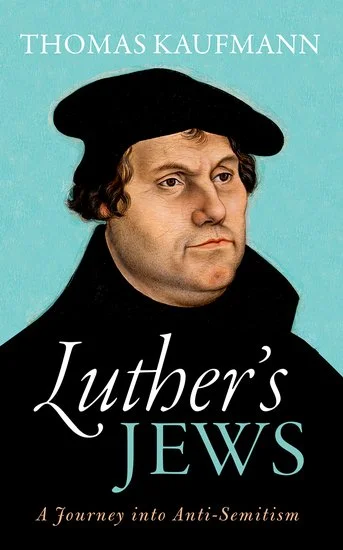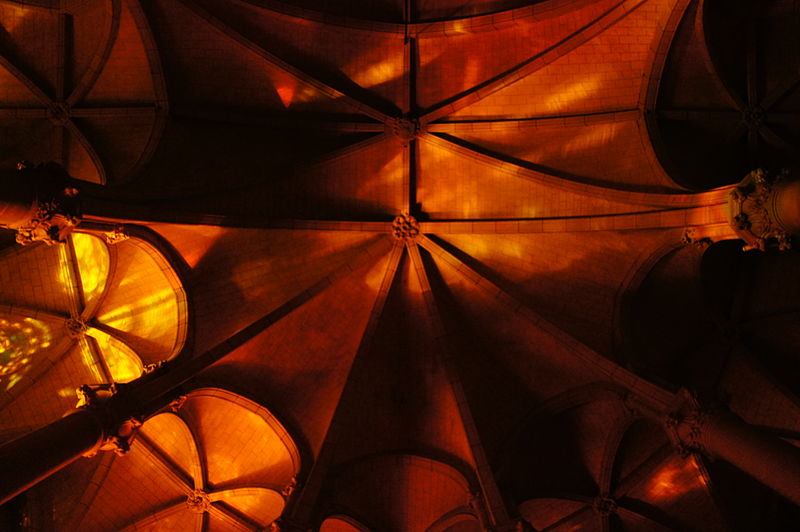This book is very painful to read. It is also absolutely necessary. “Luther’s attitude to the Jews, though it makes him incomprehensible, indeed unbearable, to people of our time, is very much of his time” (153). This in brief is Kaufmann’s thesis: that Luther’s anti-Judaism and premodern anti-Semitism is representative, not unique, of the sixteenth-century church—small consolation for Lutherans and Christians. At yet, at the same time, we see in Luther two polarities of thought that are so mutually opposed as to be fundamentally bewildering...
Triduum
In the garden—
amid the grappling
with anguish and silence
—a sound of sounds arising
as if from earth itself
scorning the tumult of the city.
Discern the sounds: mountain
goat bleating her birth; thump
of wild ass and ox; futile beating
of outstretched ostrich wings...
The Confessional Indifference to Altitude
It astounds me that, in the twenty-two years I have shared responsibility for the liturgical formation of seminarians, I have heard Lutherans invoke the terms “high church” and “low church” as if they actually describe with clarity ministerial positions regarding worship. It is assumed that I am “high church” because I teach worship and know how to fire up a censer. On occasion I hear acquaintances mutter vituperatively about “low church” types, apparently ecclesiological life forms not far removed from amoebae...
Review of "Confessing the Gospel"
This two-volume set had its genesis in 1983 under the leadership of the late Ralph Bohlmann, president of the Lutheran Church–Missouri Synod at that time. It was hoped that a new dogmatics text would build on the work of Franz Pieper’s Christian Dogmatics (Volume 2 published in German in 1917; Volume 3 in 1920; Volume 1 in 1924; and the whole set translated into English in the 1950s) while addressing more recent developments in both churchly and academic theology. Writers from the LCMS and its international partners were recruited to address doctrinal topics within their fields of expertise. It would take over thirty years for the project to be brought to publication...
Font to Table or Table to Font?
What was once viewed as a radical departure from the tradition is being practiced by more and more mainline Protestant congregations in an attempt to be radically hospitable to the 'outsider.' Inviting all who are present to come to the Lord’s Supper (as a matter of principle, as opposed to accidentally communing on occasion someone who is not baptized) is becoming a normative practice in some ELCA congregations...
The Certain Ambiguity of Catholicity
I am a member of the Lutheran Church-Missouri Synod because, like most Missouri-Synod Lutherans, it is the church body into which I was born. It is not all that surprising, even in this age of consumer-driven Christianity, that many folks still cling to the church of their birth. Inertia is a powerful thing. But why I continue to remain a part of this synod is more complex than simple inertia...
Where Have All the Women Gone?
When I was in seminary and later in graduate school, I couldn’t help but notice a seeming paradox: that I was about the most “orthodox” of the women students, but I had come from the most “liberal” background. I was staggered and somewhat disbelieving when women from “conservative” backgrounds related the kind of notions they’d been raised with. I had certainly never been told that my choice of clothing was the one thing standing between young men and sin, or between young men and rape. I had never been told that my chief duty in life was to submit to my husband. I had never been told that I was ontologically disqualified from speaking the word of God on account of my biological sex...
Review of "A Theology in Outline" by Robert W. Jenson
One encounters but rarely that exquisite simplicity which only a master of things immensely complex can produce. Such is this book. Robert W. Jenson has been a theological force to reckon with, in this country and abroad, within Lutheranism and without. His own masters have been the prophet Ezekiel, Martin Luther, Jonathan Edwards, and Karl Barth, and it’s hard to get very far in his writings without stumbling across some Hegel. One of his foremost projects has been the revision of inherited Greek metaphysics according to the contrary account of reality offered by the holy Scriptures. Thus you would not necessarily expect this man, elegant writer though he has always been, to be so accessible...
Reintroducing Candlemas
I love liturgy. The solemnity of ritual enchants me. I consider it a great gift that, in the midst of “the changes and chances of this life,” as the prayer puts it, liturgy can hold many images and themes in unresolved, creative tension. In an era of societal polarization, we need liturgy’s particular ability to present multivalent meanings, to invite us into a life shaped by both/and rather than either/or. Liturgy presents us with ever-new and renewing visions of ourselves and God. I love liturgy and I want others to love liturgy, too, because liturgy is about and directed to God. Liturgy proclaims the gospel...
Review of "Luther's Theology of Beauty" by Mark C. Mattes
When I finished my doctoral thesis on Luther’s Theology of Music I hoped that some more capable theologian would investigate the themes I had accidentally come across: Luther’s theology as a theology of beauty and pleasure. In his Martin Luther’s Theology of Beauty, Mark C. Mattes has fulfilled my wish. His title does not indicate a distinct issue within Luther’s thinking, such as the role of art in Christian worship or more remote issues such as Luther’s artistic likings or aesthetic principles that may be traceable in his writings. Rather, Mattes’s study is an outline of Luther’s theology approached from the perspective of beauty...
The Third Use for Doves and Serpents
Recruitment, rather than “evangelism” or a “membership drive,” should attract people to the church as the body of Christ, trained for disciplined discipleship. Such an approach will draw attention to the reality of life as seen by the writers of the Lutheran Confessions—namely, that believers need the discipline of the law to survive the interim between the first and second coming of Christ. That is why the final part of the Lutheran Confessions, the Formula of Concord, speaks of a careful distinction between divine mandates (law) and promises (gospel). The crucial work of the law involves its several uses...
Your Lamps with Gladness Take
The parable of the wise and foolish bridesmaids in Matthew 25:1–13 was one of the best-loved Bible stories in the Middle Ages and early modern period. In contemporary times, however, this parable is far less popular than it was for our forebears, and for a number of reasons...
Lousy Preaching and What to Do about It
Preaching is the cornerstone of any pastorate, and for many pastors it is the centerpiece of their ministry. For those with little experience, it is a daunting task. Even seasoned veterans can approach preaching with anxiety, given the priority Lutherans place on the proclamation of the word. In preaching pastors are asked to be fluent in Scripture, the local context, and the theology of both our Lutheran heritage and the church catholic. So how do preachers go about it?...
The Not-So-Ancient Origins of Christ the King Sunday
Christ the King is not a festival of great antiquity, supplying the church year with neat narrative punctuation from time immemorial. In fact, the festival didn’t emerge until the twentieth century, and at first it had nothing to do with the end of the church year at all...
Viewing the Real Presence
Cranach’s well-known Wittenberg altarpiece from 1547 depicts the Wittenberg congregation listening to Luther’s preaching. In the middle of the scene, between the preacher in the pulpit and those hearing the word, hovers an image of the crucified Christ characterized by a kind of surreal realism...
No Rest for the Lutherans
The confessional Lutheran understanding of the Sabbath has always had tough sledding in America. Historically, the dominant religious culture in the U.S. is Reformed, and, more specifically, Puritan; and that tradition’s distinctive understanding of Sunday as “the Christian Sabbath” has been a persistent characteristic of American religion. Philip Schaff, the German Reformed historian and theologian, called it the “Anglo-American Sabbath”...
Review of "Four Birds of Noah’s Ark" by Thomas Dekker
I begin with a confession: the point during the worship service when I am most likely to yawn, get distracted, get plagued by phantom itches, or decide I have to go the bathroom is during the Prayers of the Church. This makes me a terrible person and a worse Christian. Nevertheless, there it is, prayer bores me far more often than it should. Which is why Four Birds of Noah's Ark is such a delightful surprise: prayers that do not bore...
Review of "Time and the Word" by Ephraim Radner
What both the historicist-materialist critical and the fundmentalist-inerrantist approach to Scripture have in common is that both are stuck on the question, “Did it really happen?” In Time and the Word, Ephraim Radner proposes a new point of departure for the church, primarily in its preaching and communal reading of Scripture, no longer beholden to either dead-end method. In so doing, he is not trying to dispense with the question of facticity. He’s rather trying to point out how limiting it is if that is the chief purpose of Scripture—to provide an accurate (or as it may turn out, inaccurate) reporting of events. And even presuming it is accurate, so what?...


















